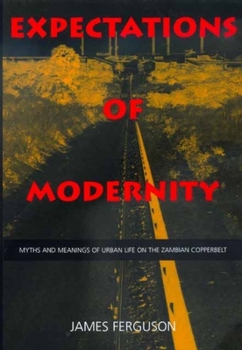Expectations of Modernity: Myths and Meanings of Urban Life on the Zambian Copperbelt Volume 57
(Part of the Perspectives on Southern Africa Series)
Select Format
Select Condition 
Book Overview
Once lauded as the wave of the African future, Zambia's economic boom in the 1960s and early 1970s was fueled by the export of copper and other primary materials. Since the mid-1970s, however, the urban economy has rapidly deteriorated, leaving workers scrambling to get by. Expectations of Modernity explores the social and cultural responses to this prolonged period of sharp economic decline. Focusing on the experiences of mineworkers in the...
Format:Paperback
Language:English
ISBN:0520217020
ISBN13:9780520217027
Release Date:October 1999
Publisher:University of California Press
Length:343 Pages
Weight:1.30 lbs.
Dimensions:1.0" x 6.0" x 8.9"
Customer Reviews
2 ratings
"Expectations of Modernity" by James Ferguson
Published by Thriftbooks.com User , 19 years ago
This is a truly rich and incisive ethnography of an African nation in the midst of long-term economic decline. Ferguson may be best known to readers as the author of 1990's "The Anti-Politics Machine", a widely acknowledged classic of contemporary social anthropology and one of the seminal works of what might be called the new development studies. Admirers of "Anti-Politics Machine" should not expect a simple retread of old material here, however. "Expectations of Modernity" focuses squarely on the lived experience of national economic decline, and the cultural and economic strategies by which retiring copper miners are adjusting to the new world order. Perhaps the most refreshing aspect of "Expectations" is Ferguson's recourse to an eclectic mix of theoretical concepts and approaches. Dick Hebdige's analysis of subculture and style, Judith Butler's insights into gender performances, and Bourdieu's reflections on cultural capital are all invoked here to shed light on Zambians' attempts to grapple with economic decline. The breadth and subtlety of the author's theoretical approach to questions of culture, power, and style enables him to challenge the old, teleological narrative of Africa's progress from "tradition" to "modernity." "Expectations of Modernity" is therefore relevant not only to Africa and the Third World, but also to all those de-industrializing and declining regions of the capitalist West that have been nourished for decades on the false promises of modernist metanarratives.
An eloquent, elegant, and important study
Published by Thriftbooks.com User , 22 years ago
I have read many ethnographies in my day, but I can't recall another that has had me at turns astounded by the author's insight, impressed with his prose, saddened by his findings, and laughing out loud at the wry wit of his descriptive voice. I do not normally consider good anthropology "fun" to read, but "EXPECTATIONS OF MODERNITY" bucks the trend. It's well-argued, impassioned, and thoroughly readable.Author Ferguson is concerned with the experience of "modernity" and "development" as lived by residents of Zambia's Copperbelt, who since the 1970s have experienced an unrelenting slide into social and economic marginalization. He works in case studies drawn from individual interview subjects, census data, and textual asides--boxes featuring news clippings from Zambian papers, or brief "People Watching" accounts of the author's street observations with his research assistant. The discussion ranges from meta-narratives of "progress" and "modernization" to an eye-opening analysis of the opposing styles adopted by Zambian urbanites.His conclusion is grim: "For many Zambians... recent history has been experienced not--as the modernization plot led one to expect--as a process of moving forward or joining up with the world, but as a process that has pushed them out of the place in the world that they once occupied." The process of globalization has not connected this corner of Africa (and its inhabitants) to the currents of prosperity traversing the world economy; rather it has disconnected them, throwing them out of the garden of "development." Ferguson stresses that they have not been "left out" of world capitalism; the processes of abjection he describes are integral parts of the system.Even amid the gathering gloom of this analysis, I found myself heartened by the author's occasional humor and by his sympathetic (and self-effacing) accounts of casual encounters in the field. I had not previously had much time for anti-globalization arguments, but Ferguson's disarming approach lowered my skepticism, forcing me to confront the ugly truths of the new world order in a way I had never done before. My hat is off to this man for crafting such a great book.





